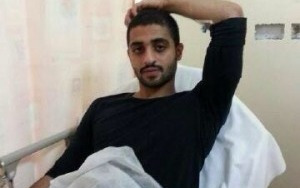Mohamed Ebrahim Hasan is a 26-year-old Bahraini citizen currently being detained in Jau Prison on charges of joining a terrorist cell and forging government papers.
On 13 February 2014, officers in plain clothing arrested Mohamed at the Bahrain International Airport and transferred him to the Ministry of Interior’s Criminal Investigations Directorate (CID). Upon his arrival, Mohamed was tortured by officers in an attempt to coerce a confession out of him. Methods of torture included physical beatings, electric shock, and threats to his family. He spent three days in detention before he was able to inform his family of his whereabouts. In a very brief phone call, Mohamed managed to tell his family “I’m fine” before the call was ended.
When he refused to confess to the charges against him, the officers transferred him between the National Security Agency (NSA) and Dry Dock Detention Center. It is believed that he was again subjected to torture and ill treatment at both locations. This pattern of transfers repeated for a period of six months. While in Dry Dock, officers held him in solitary confinement and prevented him from using the bathroom until it was apparent that his health was deteriorating. Mohamed specifically identified CID and NSA officers as the perpetrators of his torture, despite the NSA’s powers of arrest and interrogation having been revoked in 2011 following a recommendation by the Bahrain Independent Commission of Inquiry (BICI), which uncovered evidence that the institution was responsible for torture and extrajudicial killing. The BICI concluded that, due its involvement in severe abuses, the NSA should be “an intelligence gathering agency without law enforcement and arrest authority.”
On 23 November 2015, Mohamed was sentenced to ten years in prison and stripped of his nationality on charges of joining a terrorist cell and forging government papers. On 27 March 2018, the Court of Appeals upheld the verdict.
Mohamed requires consistent medical treatment due to injuries he suffered in March 2011, when he was shot by officers at Salmaniya Medical Complex after the demonstration at Pearl Roundabout. Mohamed still has shotgun pellets in his lungs and heart wall. He also suffered a major injury to his abdominal area from the same incident, which required him to undergo surgery. Since then, Mohamed suffers problems with his digestive system and requires medical treatment.
While in Dry Dock Detention Center, Mohamed was refused medical treatment by both the prison administration and the clinic doctor; they allegedly suspected him to be lying about his symptoms.
Due to the torture and his other injuries, Mohamed suffers from severe vomiting, shortness of breath, and weakness to the point where he can no longer stand on his own. His family reports that he never received medical treatment following his torture, only painkillers and IV fluid. They also submitted complaints to the Ministry of Interior Ombudsman and the Bahraini National Institution for Human Rights (NIHR) following his continued denial of medical treatment. At this time, no action has been taken by either body.
Mohamed is now held in Jau Prison, where he continues to suffer from ill treatment. In the absence of proper medical care, Mohamed’s digestive system has become infected and he is unable to eat certain meals without becoming ill. Mohamed requires medication that he has been continuously refused. During his detention in Jau the authorities have also placed him in solitary confinement as punishment for engaging in Shia religious practices and prayers.
Bahrain’s actions against Mohamed violate international law, including the Convention Against Torture and Other Cruel, Inhuman or Degrading Treatment or Punishment , the International Covenant on Civil and Political Rights (Articles 7 and 18), and the International Covenant on Economic, Social and Cultural Rights (Article 12). Bahrain is a party to each of these treaties.
ADHRB calls upon Bahrain to uphold its human rights obligations by annulling Mohamed’s conviction and ensuring that any subsequent trial is consistent with due process and fair trial rights. We additionally urge the authorities to investigate claims of torture and ill treatment by officials and to hold them accountable for their actions. We also call upon the authorities to provide sufficient medical treatment and medication to Mohamed and all others in Bahraini custody.
Editor’s Note: ADHRB originally reported that Mohamed was shot during the demonstrations at Pearl Roundabout, when he was in fact shot at Salmaniya Medical Complex in the aftermath.





